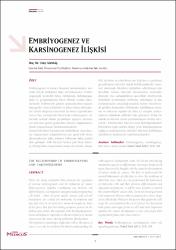Embriyogenez ve karsinogenez ilişkisi.
Künye
Gormus U. Embriyogenez ve karsinogenez ilişkisi. Nobel Medicus. 2011; 7(3): 5-9.Özet
Embriyogenez ve kanser oluşumu mekanizmaları arasında birçok moleküler ilişki söz konusudur. Embriyogenezde kontrollü hücre bölünmesi, farklılaşması, göçü ve programlanmış hücre ölümü olayları izlenmektedir. Embriyonik gelişim esnasında önem taşıyan bazı genler ve/veya faktörler ve hücre-hücre etkileşimleri tümör oluşumu esnasında da önem taşımaktadır. Ayrıca bazı embriyonik hücrelerde embriyogenez sürecinde normal olarak gerçekleşen apoptoz olayında yer alan bazı genler gelişmekte olan bu organizmaları tümör oluşumundan da korumaktadırlar.
Kanser kök hücre kavramı öne sürüldükten sonra kanser oluşumunun anlaşılabilmesi için genel kök hücre davranışlarının daha anlaşılır kılınması daha gerekli hale gelmiştir. Kök hücreler birden çok türde hücreye dönüşebilme kapasitesine sahip hücrelerdir, kanser kök hücreleri ise tümörlerde asıl büyüme ve yayılmayı gerçekleştiren hücreler olarak belirlenmişlerdir. Anormal davranışlı hücrelere müdahale edilebilmesi için öncelikle normal hücresel davranışların moleküler düzeyde iyice anlaşılabilmesi gereklidir. Embriyonik hücrelerin davranışları, bölünme, farklılaşma ve göç mekanizmaları anlaşıldığı takdirde kanser hücrelerinde görülen kontrolsüz bölünmeler, farklılaşma sorunları ve metastaz olguları da daha iyi anlaşılır, dolayısıyla da müdahale edilebilir hale gelecektir. Fakat bu alanda henüz tam olarak yanıtlanamayan sorular mevcuttur: Embriyodaki hücreler nasıl farklılaşmaktadır? Hücrelerin doğru şekilde doğru yerde farklılaşmalarını sağlayan mekanizmalar nelerdir? Hücreler farklılaşma özelliklerini kaybederek nasıl kanserleşirler? There are many molecular links between the regulation of normal embryogenesis and the induction of cancer. Embryogenesis includes coordinated cell division, cell differentiation, cell migration and genetically programmed cell death. Some of genes and/or factors and cell-cell interactions are critical for embryonic development and also play roles in -or altered in- tumor development. Some of the genes that function during apoptosis process in the embryo also protect the organism from developing tumors. Genes identified as important in the development of human cancers are also active during embryonic development.
The hypothesis assuming a single stem cell as the source of cancer can only be confirmed by better understanding the embryogenesis mechanisms. Stem cells are the ones having maximum capacity to differentiate into many kinds of cell types, they are also thought to be the cause for development of various kinds of tumors. We have to understand the normal behaviours of cells first to solve the problems of abnormal ones. Since we can understand the behaviours of embryonic cells and their division, differentiation and migration mechanisms, it will be more possible to control the ‘uncontrollable’ cancer cells. There are lots of questions to be answered: How an embryo acquires the correct shape as its cells divide? What are the factors that guides the cells to get the correct form in the correct place? Are there fixed body plans and organ forms in cell? And most important question for cancer development is how cells forget their organization plans and create tumors?


















